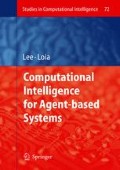We present the iDorm which is an experimental test bed for ubiquitous computing environments research at Essex University. The iDorm is equipped with a number of passive and intelligent embedded agents with different capabilities and restrictions. In this work we define a passive agent as an embedded computer that delivers purely sensory information, whereas the intelligent embedded agents are embedded-computers enhanced with intelligent reasoning and learning.
Access this chapter
Tax calculation will be finalised at checkout
Purchases are for personal use only
Preview
Unable to display preview. Download preview PDF.
References
Acampora G, Loia V (2005) Fuzzy Control Interoperability and Scalability for Adaptive Domotic Framework, IEEE Trans Industrial Informatics, 1: 97-111
Atanasova, T (2000) XML view of fuzzy system knowledge, 3rd International workshop on Personal Computers and Particle Accelerator Controls PCaPAC, Hamburg, Germany
Babuska R (1997) Fuzzy Modelling and Identification. Ph.D thesis, University of Delft
Bielikova M and Krajcovic T (2001), Ambient Intelligence within a Home Environment, ERCIM News, No. 47, pp. 12-13
Callaghan V, Clarke G, Colley M, Hagras H, Chin J, Doctor F (2004) Inhabited Intelligent Environments, BT Technology Journal, 22(3): 233-247
Chin J, Callaghan V, Colley M, Hagras H, Clarke G (2005), End-User Programming in Pervasive Computing Environments, The 2005 International Conference on Pervasive Systems and Computing PSC-05, Monte Carlo Resort, Las Vegas, Nevada, USA
Doctor F, Hagras H, Callaghan V (2005) A Fuzzy Embedded Agent-based Approach for Realizing Ambient Intelligence in Intelligent Inhabited Environments, IEEE Trans Systems, Man, and Cybernetics A, 35(1): 55-65
Duman H, Hagras H, Callaghan V (2007) Intelligent Association Selection of Embedded Agents in Intelligent Environments. J Pervasive and Mobile Computing 1-41
Duman H, Hu H (2001) United We Stand, Divided We Fall - Team formation for multiple mobile robot applications, J Robotics and Automation, 16
eGadgets (2006), Extrovert-Gadgets, http://www.extrover-gadgets.net
Kosko B (1992), Neural Network and Fuzzy Systems, ISBN 0-13-611435-0, Prentice-Hall
Hagras H, Callaghan V, Colley M, Clarke G, Duman H (2002), Online Learning and Adaptation for Intelligent Embedded Agents Operating in Domestic Environments, Fusion of Soft Computing and Hard Computing for Autonomous Robotic Systems, Studies in Fuzziness and Soft Computing Series, Physica-Verlag
Hagras H, Callaghan V, Colley M, Clarke G, Pounds-Cornish, A, Duman H (2004), Creating an Ambient-Intelligence Environment Using Embedded Agents, IEEE Intelligent Systems Magazine, 19(6): 12-19
Holmquist H, Mattern F, Schiele B, Alahuhta P, Beigl M, H Gellersen (2001), Smart-Its Friends: A Technique for Users to Easily Establish Connections between Smart Artefacts, Proceedings of UBICOMP 2001, Atlanta, GA, USA
McCann J, Kristoffersson P, Alonso E (2004), Building Ambient Intelligence into a Ubiquitous Computing Management System, International Symposium of Santa Caterina on Challenges in the Internet and Interdisciplinary Research, SSCCII-2004, Amalfi, Italy
Mozer M (1999) The Neural Network House: An Environment that adapts to its Inhabitants, Proceedings of the AAAI
Norbisrath U, Mosler C, Armac I (2006), The eHomeConfigurator Tool Suite, Workshop on Pervasive Systems (PerSys 2006), Montpellier, France
Tennefoss M (1998), Open, Interoperable Systems for Energy Control, Strategic Planning for Energy and the Environment, Lilburn, GA, ETATS-UNIS, pp. 39-47
Trindler J and Zwinker R (2003), Adaptive Building Intelligence, Research Work Report, University and ETH Zurich
Wang LX (2003) The WM Method Completed: A Flexible Fuzzy System Approach to Data Mining, IEEE Trans Fuzzy Systems, 11(6):768-782
Weiser M (1993) Some computer science problems in ubiquitous computing, Communications of the ACM, 36(7):75-84
Wikipedia (2006) Wikipedia Web dictionary http://www.wikipedia.org
Author information
Authors and Affiliations
Editor information
Editors and Affiliations
Rights and permissions
Copyright information
© 2007 Springer-Verlag Berlin Heidelberg
About this chapter
Cite this chapter
Duman, H., Hagras, H., Callaghan, V. (2007). Adding Intelligence to Ubiquitous Computing Environments. In: Lee, R.S.T., Loia, V. (eds) Computational Intelligence for Agent-based Systems. Studies in Computational Intelligence, vol 72. Springer, Berlin, Heidelberg. https://doi.org/10.1007/978-3-540-73177-1_3
Download citation
DOI: https://doi.org/10.1007/978-3-540-73177-1_3
Publisher Name: Springer, Berlin, Heidelberg
Print ISBN: 978-3-540-73175-7
Online ISBN: 978-3-540-73177-1
eBook Packages: EngineeringEngineering (R0)

